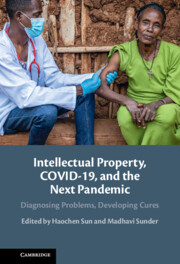Intellectual Property, COVID-19, and the Next Pandemic
This volume assesses the role of intellectual property in pandemic times through lessons learned from COVID-19. Authored by an international roster of experts, chapters diagnose causes for the inequitable distribution of lifesaving COVID-19 vaccines and offer concrete suggestions for reform. From delinking vaccine development from monopoly rights in technology, to enhanced legal requirements under national and international law for sharing publicly funded technologies, to encouraging funding and technology-sharing by rich nations to build local vaccine manufacturing capacity in low- and middle-income countries, this work highlights timely intellectual property reforms that prepare us for the next pandemic. This title is also available Open Access on Cambridge Core.
Haochen Sun is a Professor of Law at the University of Hong Kong Faculty of Law and an expert on intellectual property, technology law, and Chinese law. His monograph, Technology and the Public Interest (Cambridge University Press, 2022), puts forward a new theoretical approach to protecting the right to technology and enforcing technology companies’ fundamental responsibilities. In spring 2023, he served as a Short-Term International Visiting Professor at Columbia Law School.
Madhavi Sunder is the Frank Sherry Professor of Intellectual Property Law at Georgetown University Law Center, Washington, DC. Professor Sunder is a widely published and influential scholar of intellectual property law, law and technology, women’s human rights, and international development. Her book, From Goods to a Good Life: Intellectual Property and Global Justice (Yale University Press, 2012), brings a humanist approach to intellectual property law. She has been Visiting Professor of Law at Yale Law School, the University of Chicago Law School, and Cornell Law School and a Fellow at the Berkman Klein Center for Internet and Society at Harvard University.

